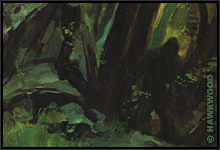This week has marked something of an event in my life: I have become an ordained minister. This particular ministry I currently share with more than 250,000 other like-minded individuals worldwide – that’s something over half of the total estimated number of Catholic priests. Mind you, [1]ordination into the ministry of The Church of the Latter-day Dude is accomplished with a few mouse clicks by merely applying for a certificate of ordination on their official [2]website. But the smooth ease of the process does not in itself explain the phenomenon that has come to be known as Dudeism.
Begun in 2005 by the journalist Oliver Benjamin, Dudeism takes its inspiration from The Dude, the ultra-laid-back character portrayed by Jeff Bridges in the Coen Brother’s 1998 film The Big Lebowski. Dudeism draws heavily upon Ancient Chinese Taoist beliefs and philosophy, and its statement that ‘the Dudeness which can be known is not the real Dude’ is typical of its style. As with the Tao, The Dude simply goes with the flow of any situation in which he finds himself, and we also can find his existential attitude mirrored in the practices of Zen. The Dude does not ‘do’. The Dude simply ‘is’.
The point with Dudeism, however, is not to wilfully emulate the Dude’s lifestyle (a gesture of mere mimicry which would be considered un-Dude-like), but to take his lead in simply being yourself – whatever that ‘self’ happens to be. That, and to resist (or perhaps more accurately, to be impervious to) the social pressures which come at us from all sides to conform to the expectations of others, to consume stuff we don’t really need, to pursue a need for status, recognition and respect from those who in their turn are too busy pursuing these goals for themselves to have time for us anyway.
For whatever reasons the movement began, it has gone on to project itself as an urban counter-culture that finds its expression in disdain for (or, again perhaps more correctly: indifference to) all the doctrinal issues which have caused such deep division between denominations in conventional religious expression. A church which has no doctrine also has no potential causes for friction within its ranks. It has largely been disagreements over points of doctrine which have created the 30,000-odd different Christian denominations, most of whose adherents probably would not worship in the church of a different denomination.
Is it possible to be a Dudeist and still maintain one’s own existing personal beliefs? Certainly. Dudeism, like Taoism, is more of an expression of a way of life, a stance towards one’s own existence, than a religion as such. And unlike one or two of the religions which currently dominate our world, it is gender-blind. Men and women have equal status. A sexist ‘glass ceiling’ does not exist within Dudeism in the way in which it does in, for example, the Catholic Church, in which by Vatican decree the aspirations for women are swiftly reached at the lowly level of the mother superior of a local convent.
In seeking answers as to why Dudeism has taken off in the way in which it has, we might find one possible answer in the alternatives. The current major players in world religions have been with us for millennia. On the one hand this might be seen as a sign of their staying power. But looked at from a different angle, their very longevity seems to square awkwardly with our mercurial 21st-century world. Social concerns and moral values which applied – literally – to the Late Bronze Age and Early Iron Age, and which were intended to address the issues and the world views of those distant times, do not sit well in a world of apps and wifi.
In stark contrast, Dudeism is very much a product of the Internet age. It not only sits comfortably in our contemporary urban environment: it addresses the issues which make that environment the pressure-cooker of stress which it has become for so many. Attempts to update existing religions only seem to produce churches whose [3]architecture is stridently ‘modern’, or the toe-curling embarrassments that are overtly-Christian rock and metal bands. And other beliefs which have arisen in our own time, and which do come with a body of doctrine, seem not to be able to shake off their cultish mind-control image. I’m sure you can think of one or two examples without too much prompting from me.
Will Dudeism survive? Even to care about the answer to this question seems a distinctly un-Dude-like thing to do. What matters is what is ‘now’. And Dudeism, like Zen, values the Now: the precious present moment which we are all-too-ready to sacrifice in pursuit of those phantoms with which a consumer society distracts us. Dudeism is live-and-let-live. Dudeism is being kind and decent to your fellow human beings without attempting to force your own lifestyle and beliefs upon them. In the catchphrase from the film: The Dude abides. Perhaps he might yet confound us all by ‘abiding’ longer even than his creators might have imagined.
Hawkwood
Notes:
[1] Dudeist ministers actually are allowed to officiate at weddings and other civic functions, local laws permitting. The official website (below) offers support with providing any necessary further credentials. Dudeism has been described as an 'open source' religion. Its adherents may input their own thoughts about it. Put another way: If you prefer to have your thinking done for you by someone else, then you're probably best off with the top-down autocratic structures of existing conventional religions.
[2] Dudeism.com. Go for it.
[3] I am thinking of my local examples here in the Netherlands. We have one new church on the outskirts of town which looks like nothing so much as the vertical stern of the Titanic just before it plunges beneath the waves: an unintended and unfortunate symbolism which apparently was lost upon those who approved this particular architect’s plans. Every time I drive past I half-expect to see Rose and Jack clinging to the roof.
Sources:
Photos from The Big Lebowski, directed by Joel and Ethan Coen, featuring Jeff Bridges as The Dude and John Goodman as Walter, distributed by Polygram Filmed Entertainment, Working Title Films.




















































































